

Health and society. A quick, easy summary Read the Full Story People’s health is influenced by social factors, including income, housing, education, diet and lifestyle – as well as age, gender and heredity.
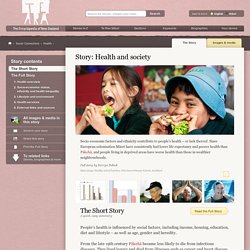
From the late 19th century Pākehā became less likely to die from infectious diseases. They lived longer and died from illnesses such as cancer and heart disease. For Māori this change happened later, in the mid-20th century. Socio-economic factors Socio-economic status (based on things like income, occupation and education) has a strong impact on health. Ethnicity Māori and Pacific people have poorer health than other ethnic groups. Lifestyle factors Cancer is a major cause of death in New Zealand. Risk factors for heart disease include smoking, poor nutrition and lack of exercise.
Cold, damp houses and polluting heating can lead to respiratory problems such as asthma. Public health. A quick, easy summary Read the Full Story Public health professionals work to prevent disease and promote good health in the community.
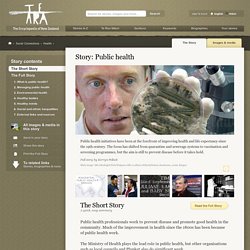
Much of the improvement in health since the 1800s has been because of public health work. The Ministry of Health plays the lead role in public health, but other organisations such as local councils and Plunket also do significant work. – Alternative health therapies. Alternative health therapies encompass a range of health and wellbeing-related treatments and products, which contrast with conventional medicine in their philosophy and practice.
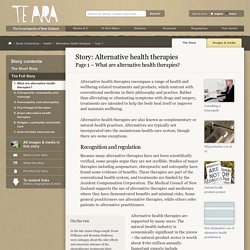
Rather than alleviating or eliminating symptoms with drugs and surgery, treatments are intended to help the body heal itself or improve and maintain wellbeing. Alternative health therapies are also known as complementary or natural-health practices. Alternatives are typically not incorporated into the mainstream health-care system, though there are some exceptions. Recognition and regulation Because many alternative therapies have not been scientifically verified, some people argue they are not credible. On the run. PHARMAC. Linkage Webhealth provider directory. DermNet NZ. Facts about the skin. Asthma Auckland. Diabetes New Zealand. Medsafe Home Page. High quality and effective alternative medicines. Neurological Foundation Of New Zealand. Depression - home. Home - Mental Health Foundation of New Zealand.
Medical Dictionary: MedlinePlus. Epic / Homepage - Te Kete Ipurangi (TKI) Kia ora and welcome to EPIC.
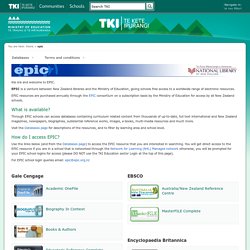
EPIC is a venture between New Zealand libraries and the Ministry of Education, giving schools free access to a worldwide range of electronic resources. EPIC resources are purchased annually through the EPIC consortium on a subscription basis by the Ministry of Education for access by all New Zealand schools. What is available? Through EPIC schools can access databases containing curriculum related content from thousands of up-to-date, full text international and New Zealand magazines, newspapers, biographies, substantial reference works, images, e-books, multi-media resources and much more. Visit the Databases page for descriptions of the resources, and to filter by learning area and school level. How do I access EPIC? Use the links below (and from the Databases page) to access the EPIC resource that you are interested in searching. For EPIC school login queries email: epic@epic.org.nz Who can use EPIC? Where can I find more information?
Complementary and alternative medicine glossary. Here are some of the more popular alternative medicine terms.
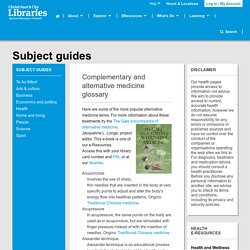
For more information about these treatments try the The Gale encyclopedia of alternative medicine , Jacqueline L. Longe, project editor. This e-book is one of our e-Resources. Access this with your library card number and PIN, or at our libraries. Acupuncture Involves the use of sharp, thin needles that are inserted in the body at very specific points to adjust and alter the body's energy flow into healthier patterns.
Understanding Differences Between Holistic, Alternative, and Complementary Medicine. The terms holistic medicine, alternative medicine and complementary medicine have often been used interchangeably.
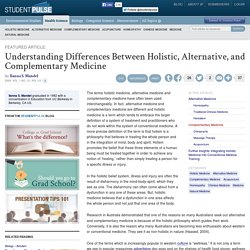
In fact, alternative medicine and complementary medicine are different and holistic medicine is a term which tends to embrace the larger definition of a system of treatment and practitioners who do not work within the system of conventional medicine. A more precise definition of the term is that holism is a philosophy that believes in treating the whole person and in the integration of mind, body and spirit. Holism promotes the belief that these three elements of a human being must be treated together in order to achieve any notion of ‘healing,’ rather than simply treating a person for a specific illness or injury.
In the holistic belief system, illness and injury are often the result of disharmony in the mind-body-spirit, which they see as one. The disharmony can often come about from a dysfunction in any one of these areas. Jobst (2005) states her conclusions thusly: Kidshealth. National Heart Disease & Health Info & Research. Medical Library. Find up-to-date information about providers, referral expectations, services offered and common treatments. Health Navigator NZ. Conditions and treatments.